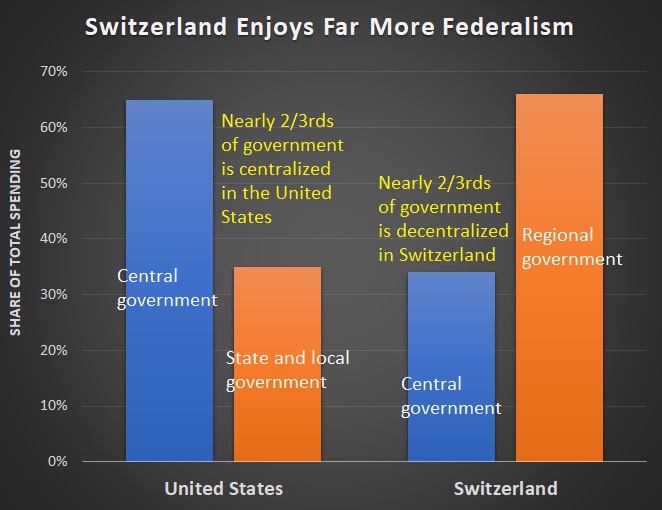Fixing entitlement programs is the the most pressing fiscal need in Washington.
In a discussion with the Club for Growth Foundation, I explain that we also need federalism – i.e., shifting programs to the state and local level.
At the risk of oversimplifying, the vast majority of Washington programs should be shut down.
Some of those activities should be left totally to the private sector (agriculture, housing, etc) while others could be picked up by state and local governments (education, transportation, etc).
As I mentioned in the discussion, Switzerland is a good role model.
It’s arguably the world’s best-governed nation. And I don’t think it’s a coincidence that it’s also the most-decentralized nation.
There are only three major exception (unless you’re an anarcho-capitalist, in which case everything is abolished).
- National defense (a small share of spending)
- Social Security (after being reformed, of course)
- Medicare (after being reformed, of course)
My former colleague Chris Edwards wrote about the need for federalism in a column for National Review. Here are some highlights of his article.
The nation is headed toward a fiscal crisis. …there is a…way to avert fiscal disaster: phase out $1.3 trillion a year in federal subsidies for state and local activities such as K–12 education, low-income housing, welfare, urban transit, and Medicaid. Devolving funding for state and local activities would slash federal deficits and stabilize the debt. As the federal government cut subsidies, the states could downsize programs or they could fill the funding void with their own resources. In the latter case, the states would do so with current revenues — not debt — because they have extensive constitutional, statutory, and economic restraints limiting debt issuance. …states are steered toward fiscal responsibility by competitive pressures. Credit-rating agencies examine state finances and make assessments that affect interest rates on state debt. The process encourages fiscal prudence… We should slash federal aid to the states to invert that structure and aim for the fiscal structure of Switzerland, where just one-third of government spending is federal. …By funding their own programs, the states could design programs to match local preferences without one-size-fits-all federal mandates. Such a decentralized fiscal structure would also boost democracy and political accountability because decision-making would move from unelected federal bureaucrats to elected state and local officials.
I would add two points to Chris’ list.
First, federalism is consistent with the Constitution (whereas most of what now happens in Washington is not).
Second, federalism would mean more national harmony (let Texans be Texans and let Californians be…whatever they are).
Actually, a third point is that federalism is not only good policy, but also smart politics.



